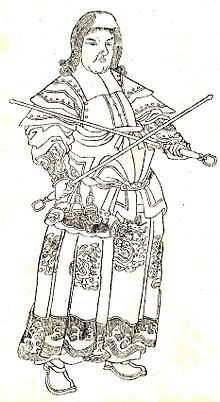Di Qing
| Di Qing | |
|---|---|
 | |
| Native name |
Family name: Dí (狄) Given name: Qīng (青) Courtesy name: Hànchén (漢臣) Posthumous name: Wǔxiāng (武襄) |
| Born | 1008 |
| Died |
1057 (aged 48–49) Zhoukou, Henan |
| Home town | Fenyang, Shaanxi |
| Children |
|
| Di Qing | |||||||||||||||
| Chinese | 狄青 | ||||||||||||||
|---|---|---|---|---|---|---|---|---|---|---|---|---|---|---|---|
| |||||||||||||||
Di Qing (狄青) (1008–1057) was a military general of the Northern Song Dynasty.
Biography
Di Qing was born to a poor family in Xihe, Fenzhou (汾州西河; present-day Fenyang, Shanxi). He sported tattoos on his face and excelled in mounted archery. In 1038, during the reign of Emperor Renzong of Song, Di Qing was appointed as Commander (指揮使) of Yanzhou (延州; covering parts of present-day Shaanxi). He participated in the war between Song and Western Xia. Each time he went to war, he would don a bronze mask and let his hair run wild and disheveled, and charge into the battlefield. Di Qing was known to be close to Song ministers such as Yin Zhu (尹洙), Han Qi (韓琦) and Fan Zhongyan. Fan Zhongyan once presented Di Qing a copy of the Zuo Zhuan and advised him to read. Di Qing took up scholarly pursuits and became a versed military strategist. He was later promoted to Deputy Commander of the Secret Cabinet (樞密副使) for his contributions. Di Qing participated in a total of 25 battles in his whole life. Of these battles, he was best known for his night raid on Kunlun Pass on the 15th day of the first lunar month in 1053.
Legends
Three Qing Dynasty novels are collectively known as the Romance of Di Qing and are attributed to Li Yutang. The central character in all 3 novels is Di Qing. The first one is originally titled "Pavilion of Ten Thousand Flowers" (萬花樓); the second one is titled "Five Tigers Conquering the West" (五虎征西) and the last one is titled "Five Tigers Conquering the South" (五虎平南). The novels also prominently feature Yang Zongbao from the Yang clan and Bao Zheng as the protagonists.
References
- (Chinese) Toktoghan et al, History of Song, vol. 290 (Di Qing).
- (Chinese) Sima Guang, Sushui Jiwen, vol. 13.